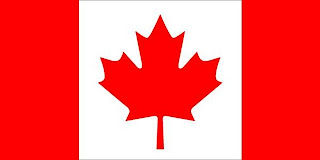
Canada (IPA: /ˈkænədə/) is a country occupying most of northern North America, extending from the Atlantic Ocean in the east to the Pacific Ocean in the west and northward into the Arctic Ocean. It is the world's second largest country by total area,[6] and shares land borders with the United States to the south and northwest.
The land occupied by Canada was inhabited for millennia by various groups of aboriginal people. Beginning in the late 15th century, British and French expeditions explored, and later settled along, the Atlantic coast. France ceded nearly all of its colonies in North America in 1763 after the Seven Years' War. In 1867, with the union of three British North American colonies through Confederation, Canada was formed as a federal dominion of four provinces.[7][8][9] This began an accretion of additional provinces and territories and a process of increasing autonomy from the United Kingdom, highlighted by the Statute of Westminster in 1931, and culminating in the Canada Act in 1982 which severed the vestiges of legal dependence on the British parliament.
A federation comprising ten provinces and three territories, Canada is a parliamentary democracy and a constitutional monarchy, with Queen Elizabeth II as its head of state. It is a bilingual and multicultural country, with both English and French as official languages both at the federal level and in the province of New Brunswick. Technologically advanced and industrialized, Canada maintains a diversified economy that is heavily reliant upon its abundant natural resources and upon trade—particularly with the United States, with which Canada has had a long and complex relationship. It is a member of the G8, NATO, the Commonwealth of Nations, the Francophonie, and the United Nations
No hay comentarios:
Publicar un comentario